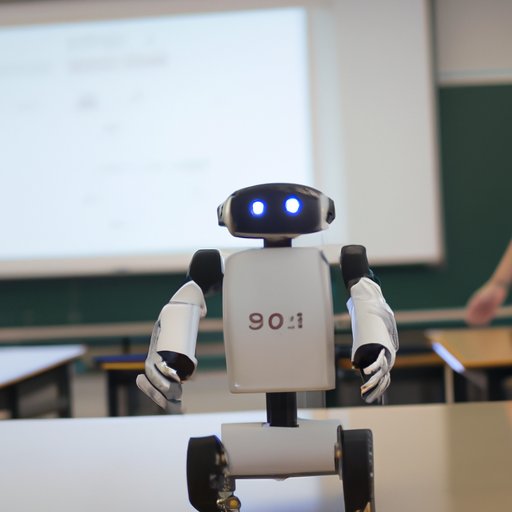Introduction
In recent years, robotics technology has become increasingly advanced, leading to speculation about the possibility of robots replacing teachers in the classroom. As technology continues to evolve, the idea of using robots to teach children has become an ever more realistic prospect. The purpose of this article is to explore the pros and cons of replacing teachers with robots and to examine the potential implications of such a move.
Examining the Pros and Cons of Replacing Teachers with Robots
Advantages of Replacing Teachers with Robots
One of the most significant advantages of replacing teachers with robots is cost savings. According to a study conducted by Stanford University, robot-led classes could reduce the cost of teaching by up to 40%. This could be a major benefit for cash-strapped school districts and universities, allowing them to make better use of their limited resources. Additionally, robots could provide a more efficient way of delivering educational content, as they can be programmed to deliver consistent lessons with minimal effort.
Robots also have the potential to offer a more personalized learning experience for students. According to a study conducted by the Massachusetts Institute of Technology (MIT), robots can be programmed to respond to individual student needs, providing tailored instruction that is tailored to the specific needs of each learner. This could help to ensure that all students receive the best possible education.
Disadvantages of Replacing Teachers with Robots
Despite the potential advantages of replacing teachers with robots, there are also some significant drawbacks to consider. For example, robots lack the empathy and understanding that comes with having a human teacher. Without a person to connect with, students may struggle to engage with the material, leading to poorer learning outcomes. Additionally, while robots can be programmed to respond to individual student needs, they cannot provide the same level of emotional support that a human teacher can offer.
Robots also lack the creativity and innovation that comes with having a human teacher. While robots can be programmed to deliver consistent lessons, they lack the ability to think outside the box and come up with new ideas. This can limit the range of learning opportunities available to students and prevent them from developing creative problem-solving skills.

How Robotic Technology Could Revolutionize Education
Potential Benefits of Implementing Robot-Led Classes
Robots are not only capable of delivering consistent lessons, but they can also be programmed to interact with students in a variety of ways. For example, robots can be programmed to recognize facial expressions and respond accordingly, allowing them to create a more engaging learning environment. Additionally, robots can be programmed to assess student performance and provide feedback in real time, allowing for a more efficient learning process.
Robots can also be used to provide access to a wider range of educational materials. For example, robots can be programmed to access online databases, giving students access to a virtually limitless amount of information. This could open up a world of possibilities for students, allowing them to explore topics that they may not have been able to do so otherwise.
Exploring the Ethical Implications of Replacing Teachers with Robots
Replacing teachers with robots raises a number of ethical questions. For example, if robots are used to deliver educational content, who is responsible for making sure that the content is accurate and up-to-date? Additionally, how will robots be regulated to ensure that they are not used to promote biased or discriminatory views? These are important questions that need to be addressed before robots can be used in the classroom.
Are Robots a Viable Substitute for Human Educators?
Investigating the Impact of Replacing Teachers with Robots on Student Learning Outcomes
One of the main questions surrounding replacing teachers with robots is whether or not it will have a positive impact on student learning outcomes. A study conducted by Stanford University found that students taught by robots performed significantly better than those taught by humans. However, the study did not take into account the potential psychological effects of being taught by a robot, which could potentially lead to poorer learning outcomes.
Discussing the Potential Benefits of Implementing Robot-Led Classes
Despite the potential drawbacks of replacing teachers with robots, there are still some potential benefits to be had. For example, robots can be programmed to provide personalized instruction to each student, allowing them to focus on their particular strengths and weaknesses. Additionally, robots can be used to give students access to a wide range of educational materials, allowing them to explore topics that they may not have been able to do so otherwise.
Conclusion
Replacing teachers with robots is a complex issue with both potential benefits and drawbacks. On the one hand, robots could provide a cost-effective way of delivering educational content and offer a more personalized learning experience for students. On the other hand, robots lack the empathy and creativity that comes with having a human teacher, and there are still many ethical questions that need to be addressed before robots can be used in the classroom.
Ultimately, it is difficult to say whether robots will ever be able to replace human teachers. However, robots can certainly play an important role in the classroom, providing students with access to a wide range of educational materials and offering personalized instruction. Whether or not robots will ever completely replace human educators remains to be seen.
(Note: Is this article not meeting your expectations? Do you have knowledge or insights to share? Unlock new opportunities and expand your reach by joining our authors team. Click Registration to join us and share your expertise with our readers.)
